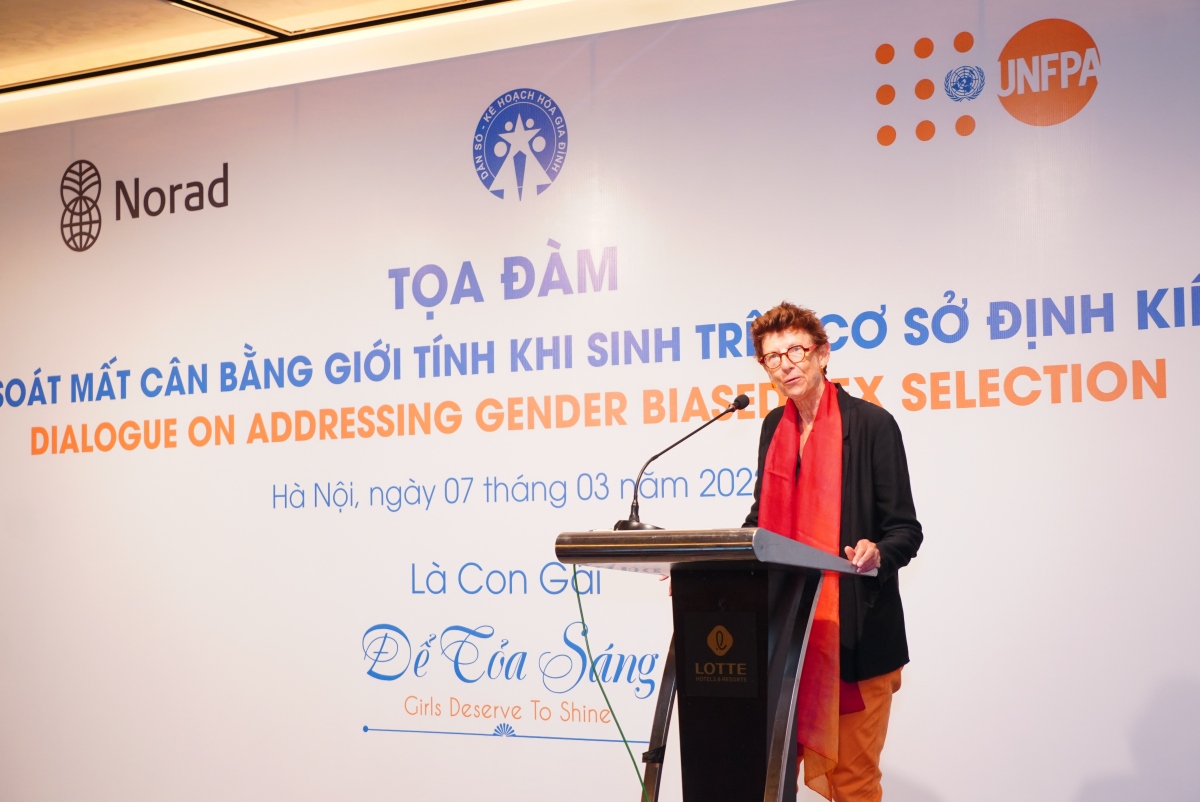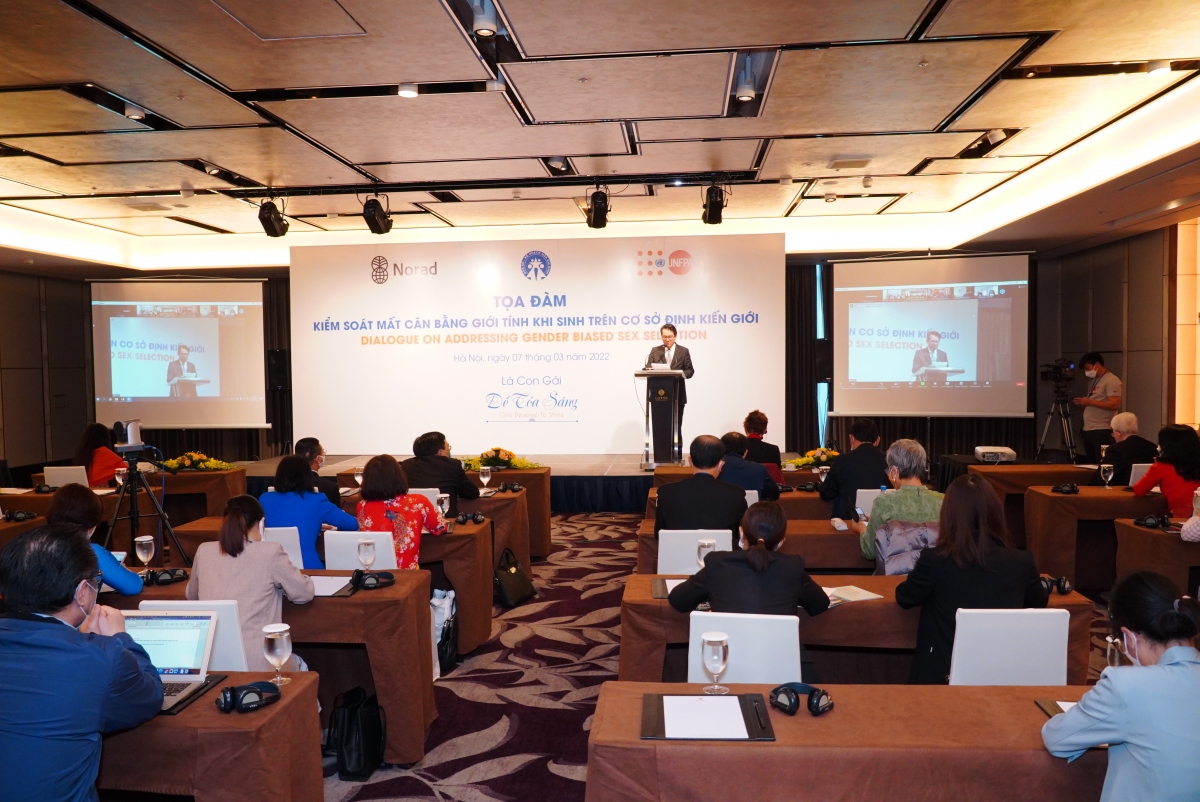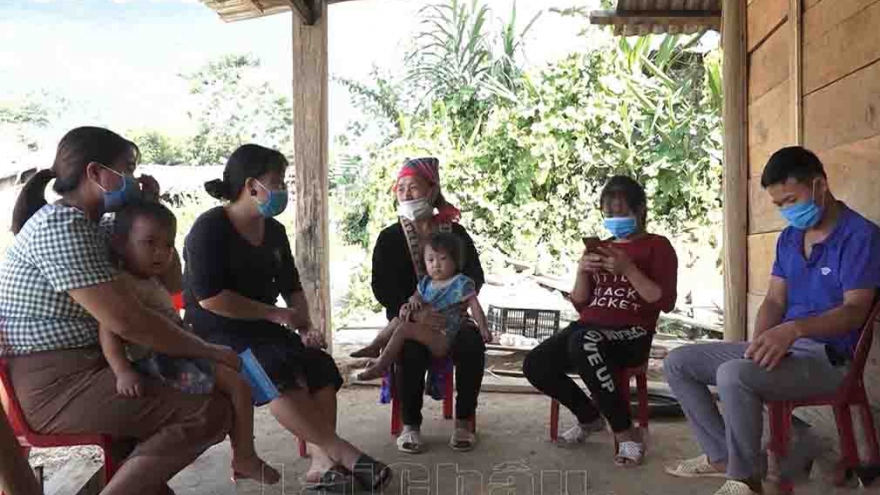Dialogue addresses gender-biased sex selection
VOV.VN - It requires a stronger multi-sectoral cooperation among all parties concerned to challenge gender norms and stereotypes so as to address the issue of gender-biased sex selection (GBSS) in Vietnam.

These recommendations were among the conclusions of the Dialogue, which was held in Hanoi on March 7 by UNFPA in collaboration with the Ministry of Health to call for stronger actions to promote gender equality, increase the value of the girl child, and re-cast men’s roles in social and family settings.
The GBSS is considered to result from son preference, fertility limitation, and the availability of reproductive technology.
Under the framework of the project “Addressing Gender Biased Sex Selection and related harmful practices in Vietnam,” which is funded by the Government of Norway for the period 2020-2022, the Dialogue shared international and innovative approaches to change socio-cultural norms leading to GBSS in Vietnam.
Men’s roles and participation in promotion for gender equality and to end GBSS, as well as the importance of strengthening the country’s coordination mechanisms for GBSS were also discussed.
Joining the discussion were senior officials from the Ministry of Health, the Ministry of Labour, Invalids and Social Affairs, Vietnam Farmers’ Union, mass organisations, and research institutions. Representatives from provincial authorities of Ben Tre, Quang Ninh, Nghe An, Hung Yen, Vung Tau and Bac Giang also joined the session virtually.
The discussion focused on the findings of the review and research conducted by UNFPA, the General Statistics Office, and the Ministry of Health in the past years using the 2019 Population and Housing Census on the current GBSS situation and interventions in Vietnam. Vietnam has legal and policy frameworks and national programmes to promote gender equality and prohibit GBSS. However, there are some policy gaps and law enforcement challenges. The current policies focus largely on health interventions, and less on socio-cultural and fertility measures. The coordination mechanism among different Ministries is also essential.
Communication programmes in the future should aim at transforming social and gender norms with regard to preferences to boys over girls and the consequences of GBSS. Communication programmes should target young people, especially boys, using diverse and creative communication channels, digital technology and social networks, in addition to traditional and established communication programmes.
To open the Dialogue, the Deputy Director General of the General Office of Population and Family Planning of the Ministry of Health, Mr. Pham Vu Hoang stressed that “If sex imbalance at birth in Vietnam continues and cannot be controlled, it will unpredictably impact the country’s socio-economic development and even the political security as well as the country’s sustainable development.

This is one of the major challenges in the population area in Vietnam. Over the past years, Vietnam has implemented many policies and programmes to address this issue as well as other issues relating to population and development. They include Resolution No.21 of the Party Central Committee – tenure XII about population matters in the new situation; Vietnam Population Strategy until 2030; the project on addressing sex imbalance at birth from 2016-2025 which was approved by the Prime Minister in 2016, ect. These policies and strategies aim to gradually address the increase in imbalances of sex ratio at birth, thus reaching the “natural” sex ratio at birth.”
In her opening remarks, HE Ms. Grete Løchen, the Norwegian Ambassador in Vietnam, said that the Government of Norway was proud to partner with UNFPA and support the Government of Vietnam to stop gender-biased sex selection and achieve gender equality.
Ambassador Grete Løchen said “The Dialogue today was another opportunity to discuss and share the best international practices to address gender biased sex selection. It is not only to raise public awareness but also to call for behavioural change, especially among men and boys. Norway gives high priority in its development policies to strengthen global norms against harmful practices and promoting the rights of girls and women. I am therefore very pleased to work together with UNFPA and the government of Vietnam to address gender-biased sex selection in Vietnam. Together, let us all join to stop gender-biased sex selection, for the brighter future of the next generations and for a prosperous Vietnam.”
Addressing the Dialogue, the UNFPA Representative for Vietnam, Ms Naomi Kitahara reiterated UNFPA’s ongoing support for implementing Vietnam’s legal and policy frameworks on GBSS.
Ms Naomi Kitahara said “I want to appeal for more participation of men and boys in ending gender-biased sex selection. As we celebrate the International Women’s Day on 8 March, it is important to recognise that women are often under pressure from her family to conceive a son rather than a daughter.
There, men’s understanding and support for women can make a lot of difference. Vietnam has done a lot to stop GBSS in the past years, but the skewed sex ratio at birth remains to be high, currently third highest in Asia. We need stronger actions, including the fertility measures where individuals and couples are able to choose the number, spacing and timing of children, in line with the principles of the International Conference on Population and Development.”
Data from the 2019 Population and Housing Census estimates that every year, 45,900 girl births are missing in Vietnam, and there is evidence to suggest that this results from prenatal gender-biased sex selection. It means that 45,900 girls are not born every year in Vietnam because they were found to be a girl.
It is also estimates that among adults aged 15–49 years, there will be 1.5 million excess males by 2034, which can further increase to almost 2.5 million by 2059 (9.5 per cent of the corresponding male population) if the current sex imbalance at birth does not decline. Vietnam’s unbalanced sex ratio at birth reached 111.5 male births for 100 female births in 2019 while the biologically “natural” or “normal” sex ratio is between 105 – 106 boys per 100 girls.



